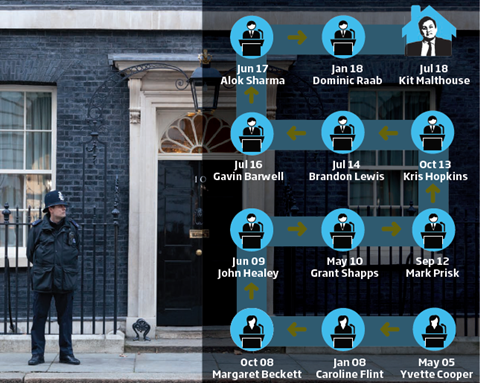Kit Malthouse, MP for north-west Hampshire, has become the fourth housing minister in 12 months.

Kit Malthouse, MP for north-west Hampshire, has become the fourth housing minister in 12 months.
His appointment was triggered by the shock resignation of Brexit secretary David Davis after the prime minister’s meeting at Chequers to hammer out the details of the Brexit plan.
Davis’s departure prompted a quick reshuffle that led to Dominic Raab, ‘leave’ campaigner during the EU referendum and housing minister for just six months, becoming the new Brexit secretary.
As the revolving door of housing ministers continues to spin, what does the industry think of another change of leadership and what impact will it have on the country’s housebuilding efforts?

Not surprisingly, housing experts are disappointed to lose another housing minister in such a short space of time. Raab was praised for giving momentum to the government’s plans to reform the planning system and had championed the ministry’s first conference on well-designed homes.
“It is always frustrating to lose ministers who are not only approachable and passionate about their brief but vocal about solutions,” says Richard Beresford, chief executive of the National Federation of Builders. “The housing crisis can only be solved with a consistent approach.”
Melanie Leech, chief executive of the British Property Federation, agrees that “yet another change is frustrating” but is pragmatic about Raab’s departure.
Yet another change is frustrating
Melanie Leech, chief executive of the British Property Federation
“The fact that we have another change of housing minister is nothing to do with how the housing brief is perceived,” she adds. “There is a much bigger political game going on. Raab was a fairly obvious choice for Theresa May to take over the Brexit role and it’s nothing to do with whether housing is seen as less important or not.”
Malthouse, a former under-secretary in the Department for Work and Pensions, has a background in City Hall and Westminster, so should “hit the ground running”, believes Leech.
Good understanding
“He understands some of the issues. From that point of view, his appointment is probably as good as it can be.”
Berkeley Group chairman Tony Pidgley agrees. “He is commercial and tough but he understands the subject,” he says. “He’s a determined and straightforward character and he wants to get the job done. I think he’ll be a good minister. ”
Malthouse will have to get to grips with the planning reforms outlined in the National Planning Policy Framework (NPPF); speed up the pace of housebuilding (a focus of the recent Letwin Review); and consider the future of Help to Buy and he must do all this without getting distracted by the Brexit debate, says Leech.
She adds: “We’re waiting on a number of key announcements, many linked to the NPPF, so now it is vital that the programme does not get delayed. We hope the [housing] agenda will survive the change of individuals – we need to keep the momentum going.”
The question is: can Malthouse slow down the revolving door long enough to make his mark on the role?






























No comments yet